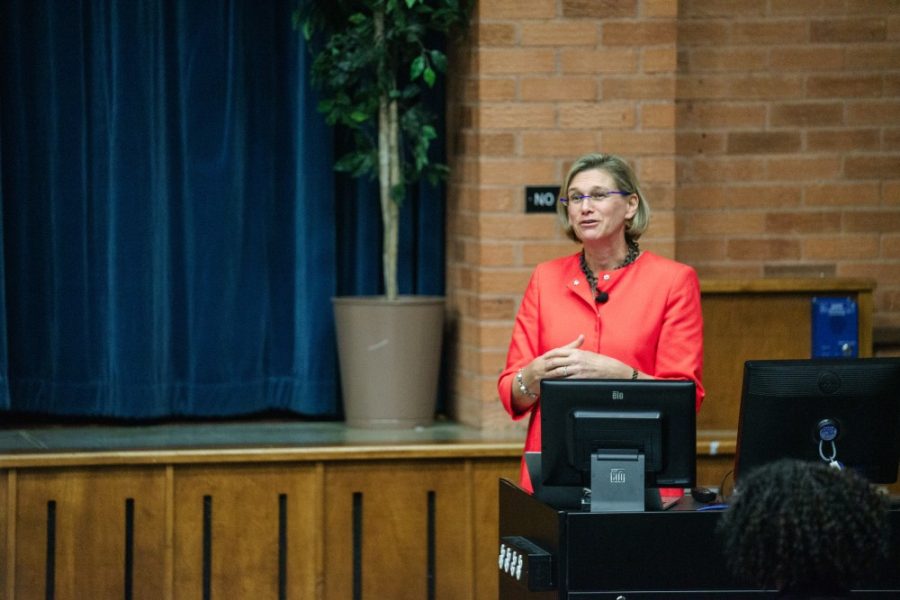The University of Arizona hosted an open forum for a provost candidate Wednesday, April 24, in the Modern Languages Building.
The candidate was Liesl Folks, the current dean of the School of Engineering and Applied Sciences at the University of Buffalo. Folks specializes in nanotechnology.
“In many ways, universities have many similar problems to businesses,” Folks said. “We have to learn how to be more efficient and effective while we’re improving the quality of what we do all the time.”
RELATED: Opinions differ at ‘Campus Conversation,’ Students demand apology from President Robbins
Barbara Bryson is a professor of practice and associate dean for research and academic affairs in the College of Architecture, Planning and Landscape Architecture. She asked Folks how her team describes her as a leader and how she makes decisions.
“I am very informed … I very much have an open door policy, and I talk to people at every level in my organization,” Folks said.
She added she does give her opinion when asked, but she said she doesn’t expect people to listen to it all the time.
“I am no micromanager,” Folks said. “I trust you. After we’ve got into some project or set direction, I trust you to go on your way with that. You don’t have to keep coming back and checking in with me. Even though if you do, I’m going to tell you my opinion.”
An audience member asked Folks to discuss how UA administration can push the university to be equally excellent in teaching and research.
“How do we transform our culture so that faculty are willing to learn new ways of delivering content that are much more effective?” Folks said. “That’s a whole institutional culture question.”
Folks added the conversation needs to start with provosts and work down to deans and departments to ensure all teaching staff and faculty are getting the incentive they need.
Another audience member asked how Folks improved recruitment of students from underrepresented backgrounds.
She acknowledged the higher education system generally does a bad job of recruiting those students.
“We work really hard in the K-12 system,” Folks said. “One of our core challenges is not that families and students don’t understand why they should be aiming to go to college or to university. They get that … what they don’t understand is how it would be possible for them. They don’t believe for their family it is an option.”
Folks said her university uses the Educational Opportunity Program, which provides support services to historically underrepresented student communities.
Alex Strong, associate director of foundation relations, asked Folks what challenges she sees the UA currently facing.
Folks said the main problem she sees is lack of support from legislature.
“Seems like you don’t have the same kind of support from your elected officials that I have in New York,” Folks said. “Even though state support for higher education continues to slide, it hasn’t caused anybody in the elected world to think they should stop telling us how to run our universities.”
Folks added she doesn’t think the lack of support in legislature is an insurmountable challenge, because the state needs the universities.
Russell Tronstad, a professor of agricultural-resource economics, asked how frequently Folks replaces people in administration appointments.
“My view is that administrative appointments shouldn’t be jobs for life, they should be term appointments,” Folks said.
She said burnout is normal in education administration positions, which is why they should have term limits, regardless of how good a person is at their job.
RELATED: Democratic candidates meet at discuss stances on immigration, development and education
Folks also said it was important to constantly be bringing in new ideas, but people in administration at the university shouldn’t be too concerned.
“There’s no way I would sweep in and fire everybody,” she said.
The next candidate forum is scheduled May 3 at 9 a.m. in the Integrated Learning Center, Room 120.
Follow Priya Jandu on Twitter









